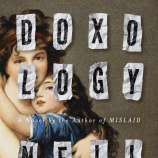Book World: In Nell Zink’s ‘Doxology,’ D.C. punk and modern politics collide
-

Doxology
Doxology
Photo: Ecco, Handout
Doxology
Doxology
Photo: Ecco, Handout
Doxology
By Nell Zink
Ecco. 402 pp. $27.99
---
"He started playing ukulele soon after his mother died."
Even blindfolded, I would know that is a sentence by Nell Zink. That subtle intersection of the ordinary and the absurd is her trademark maneuver. Wit ricochets around her straight-faced sentences like marbles in a can. Every funny phrase sounds tossed off under her breath, an irreverent little prize for the attentive reader.
Even the facts of her life sound slightly surreal. For a few years she produced a zine about punk musicians and their pets. She was discovered by Jonathan Franzen after writing to him about a German ornithologist. She has worked in construction and holds a PhD in media studies. She is, one starts to suspect, a character in a novel by Nell Zink.
But despite its eccentricities, her latest book, "Doxology," is surprisingly conventional. It is a long novel about an East Coast family woven into recent historical and political events. This time around, there is no straining against the dimensions of reality, no postmodern backflips. It feels like a quirky genius trying her best to behave at the dinner table.
The first, and best, section of "Doxology" is about the unusual friendship between several people born in the late '60s. The heroine, Pam, grows up in northwest Washington to a pair of WASPy parents who "didn't believe in predestination, but they behaved as if it were revealed truth." Before Pam hits puberty, she's already making money as a programmer, but the work doesn't excite her. "She resolved to become a retro hippie earth mother," Zink writes. She dives into the punk scene, worships Ian MacKaye and starts her own band called the Slinkies. At 17, with $70 in her pocket, she jumps on a bus and moves to New York City for an adventure more exciting than "all her experiences of sex, music, nature, and drugs combined ... She was exactly where she wanted to be."
The most endearing aspect of "Doxology" is the resilient joy racing through Zink's characters. That is certainly true of Pam, who gets a job in computer security and plays guitar in a "hard-sucking power duo that has no songs." And it's true of her future husband, Daniel, who "lived in a state of persistent ecstasy." Raised by born-again Christians in Wisconsin, he's a post-sensitive '80s hipster who desires nothing but to love Pam and manage a record label. "He wanted to design record covers," Zink writes, "compose press releases, and gain a reputation - among the handful of people who mattered to him - as a man of wit and taste."
That dream is almost fulfilled when Pam and Daniel team up with a fearlessly ebullient young singer named Joe. Joe has a rare genetic condition called Williams syndrome that may contribute to his gregariousness and his penchant for constantly making up songs about anything - from the most banal to the most obscene - for an endless stream of punk doggerel:
(BEGIN ITAL)This world is small
I see you all
Killing my head
With how you bled
And now you're dead
Dead, dead, dead.(END ITAL)
Zink is treading on treacherous ground here. As the father of a daughter with cerebral palsy, I confess I am acutely sensitive to the tendency to romanticize characters with special needs - to make them embodiments of precious wisdom or treacly tragedy. To her credit, Zink avoids those temptations. In fact, the danger of romanticizing Joe even becomes a subject of strident debate among his friends. He remains entirely his own lovable, fearless self, as capable of shrewdness or foolishness as anyone else. He knows what he likes, which is the sheer pleasure of words. His second album is called "Viscosity" because he enjoys saying "viscosity." The lyrics of one song repeat the line "Nitchpakroyd like an android!" Zink notes that the phrase could "imply precocious excellence in basketball or something to do with race, pedophilia, emotional detachment, or drugs. Nobody knew, too many people cared, and Joe never gave it any thought."
Zink saves her satirical fire for the world that moves in on Joe, a culture of corrupt and grasping commercialism. Her portrait of the parasitic relationship between fans and their idols is hilarious; her take on the record business exposes an industry of endemic pomposity and abuse. "Doxology" includes an interview from Rolling Stone that is so spot on the magazine could sue for plagiarism if Zink had not made the whole thing up.
But about halfway through the novel, history crashes into this plot, and it feels like somebody unplugged the electric guitars. What was initially a brash riff on pop culture becomes, in the story's next generation, a fairly labored postmortem of the Clinton/Trump campaign. The crazy strains of punk rock give way to the staid chords of D.C. power brokers and their armies of well-educated millennials trying to manipulate American voters. Zink is an astute critic of our recent election and its alarming abuses, but this shift seems designed as a grasp for weightiness and relevance, which succeeds at the expense of the novel's humor and surprise. In the same way, a final section about a privileged young woman trying to choose between a wealthy older suitor and a penniless young lover is pleasant, but surprisingly bland.
Bring back Minor Threat - and Zink's electric wit.








Gloss